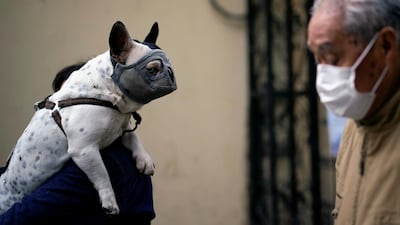A website selling fake Covid-19 vaccines in the US and a spike in online shopping scams in the UK are among a rising tide of fraud cases being reported in relation to the coronavirus outbreak.
On Sunday, the US Department of Justice said it had shut down a website purporting to sell a coronavirus vaccine, marking its first act of federal enforcement in connection with the pandemic.
Lawsuits were filed against the site coronavirusmedicalkit.com, which was attempting to con customers with a statement on its homepage that read: "Due to the recent outbreak for the Coronavirus (Covid-19) the World Health Organization is giving away vaccine kits. Just pay $4.95 for shipping."
There is currently no vaccine for the new coronavirus and authorities in the US and other countries are struggling to contain the rise of misinformation that has accompanied the spread of the pandemic.
In the UK, authorities have seen an increase in reports filed on fraudulent activity linked to the coronavirus. The national police reporting centre Action Fraud said it had received 105 fraud complaints since February 1, with a spike in recent days after 38 cases were reported from March 14 to 18 alone.
Many relate to online shopping scams with orders for products that never reached the buyer, including hand sanitisers, face masks and other hygiene products to reduce the risk of infection.
There are also reports of scammers with bogus hygiene products posing as door-to-door salespeople, and of thieves offering personal shopper services to steal people's money. Older people, who have been strongly advised to observe strict social distancing measures, are particularly vulnerable, the Metropolitan Police said.
“We have recently received a small number of reports of individuals offering to go shopping for the elderly within our community as a means to then keep their money,” the Met said in a tweet last week.
Another common tactic is fraudsters contacting victims over email and pretending to be from research organisations affiliated with the Centres for Disease Control and Prevention (CDC) and the World Health Organisation (WHO).
The victims are offered access to a list of coronavirus-infected people in their area, accessible via a link which then leads to a malicious website or asks them to make a payment in Bitcoin.
Australia's cyber security agency Scamwatch has warned that fraudsters are adapting technology to play on people’s fears around coronavirus. Since February 1, Scamwatch, which is run by the Australian Competition and Consumer Commission (ACCC), has received 94 reports of scams about coronavirus, the agency said in a statement released last Friday.
Popular scams include misinformation about cures for the disease or pedalling offers of investment advice in the coronavirus economy. Others claim to be from health authorities in an attempt to access people's personal data, including bank details.
“Understandably, people want information on the pandemic, but they should be wary of emails or text messages claiming to be from experts. For the most up-to-date information about the coronavirus, visit the Department of Health and the World Health Organisation websites directly,” ACCC Deputy Chair Delia Rickard said.
London-based Action Fraud has received reports of over 200 coronavirus-related phishing emails attempting to steal personal information through a range of tactics.
“We have already seen fraudsters using the Covid-19 pandemic to scam people looking to buy medical supplies online, sending emails offering fake medical support and targeting people who may be vulnerable or increasingly isolated at home,” Graeme Biggar, Director General of the National Economic Crime Centre said.
“These frauds try to lure you in with offers that look too good to be true, such as high return investments and ‘healthcare opportunities’, or appeals for you to support those who are ill or bogus charities,” he added.
The warnings came as a UK-based think tank, Policy Exchange, warned that the pandemic was the biggest policing challenge for 75 years.
The report, Policing a Pandemic, said there would be potential increase in violence between drug gangs fighting over dwindling profits.
“The Government will have to give them [the police] all possible support, including military back-up so that the police can maintain law and order on the streets,” said Richard Walton, a former senior London counter-terrorist officer who co-authored the paper.














